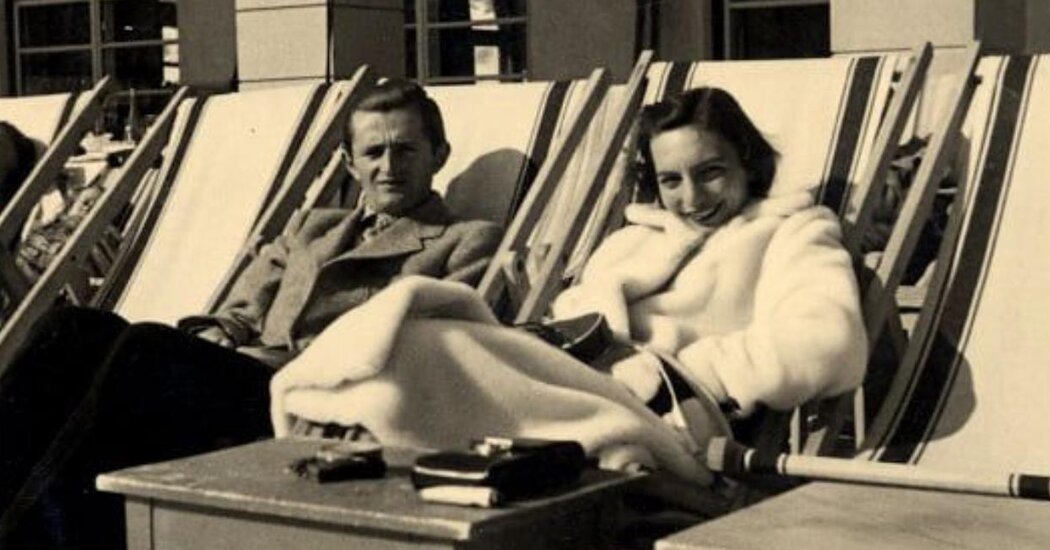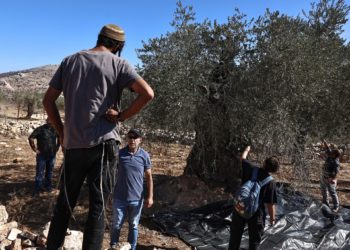INDIGNITY: A Life Reimagined, by Lea Ypi
Shortly after the publication of Lea Ypi’s 2021 memoir “Free,” which recounts her childhood in Albania before and after the fall of communism, a photograph was posted by a stranger on social media. Taken in 1941 in Cortina, a luxury ski resort in the Italian Alps, the image shows Ypi’s paternal grandmother, Leman, and grandfather, Asllan, reclining on lounge chairs on their honeymoon.
A dead ringer for Ypi herself, Leman is smiling widely but has a “vaguely distracted expression,” while Asllan stares into the camera. The photo, which was new to Ypi, quickly went viral, accompanied by a stream of accusations, among them that Ypi, who teaches political theory at the London School of Economics, was an apologist for communism and that her grandmother had been a Fascist collaborator or a spy.
As a child, Ypi had often been told by her grandmother that she’d “felt the happiest person alive” on her honeymoon in Cortina. The photo sets Ypi on a quest to discover who Leman really was and how she could have been so happy in the winter of 1941, when Italy was allied with Nazi Germany and war raged in Europe and beyond. Ypi must also reckon with how — and if — she should defend the dignity of her grandmother, who died in 2006. “Indignity: A Life Reimagined” is the author’s attempt to animate these questions.
Born in 1918 in Salonika (now Thessaloniki, Greece) to an ethnic Albanian, Muslim family, Leman has a cosmopolitan and multilingual childhood. She speaks French and Albanian with her family, Ladino with her Sephardic friends and Greek on the streets. Her life is one of privilege, even as the tides of history — the collapse of the Ottoman Empire, the forced population exchange between Turkey and Greece, rising nationalism, the financial crisis of the 1930s — reshape borders and portend worse things to come.
In 1936, Leman, at 18, leaves Salonika for Albania, where she is “from” but has never been. She is looking for a job or an adventure, to “finally be understood.” She is also fleeing the stifling expectations that claimed the life of her Aunt Selma, a vibrant intellectual who took drastic measures to avoid marrying a businessman — an unctuous German now making advances on Leman. “There must be other rooms, surely, surely,” thinks Leman as she prepares to leave.
In Tirana, she finds work as a civil servant and meets Asllan Ypi, the son of Xhafer Bey Ypi, the former prime minister of Albania and a supporter of the Fascist government. Unlike his father, Asllan is on the left politically when Leman meets him, reading socialist tracts and exchanging ideas with his former classmate Enver Hoxha, who will go on to convert Albania into a Stalinist-style totalitarian state and lead it for four decades.
Leman and Asllan debate progressive ideas, marry after she proposes to him, and have a son in 1943, as the German Army occupies Albania. Opposed to the new regime, Asllan is arrested in 1946 for political agitation and collaboration with British intelligence officers. The expansive world Leman had hoped to find turns into forced labor for her, insufficient medical care for their asthmatic son and prison cells for Asllan, who is jailed for nearly 15 years.
With limited records, Ypi writes her historical chapters as fiction, drawing on archival finds and snippets she learned from her grandmother. We find Leman drinking in the sights of 1939 Tirana — “exhausted horses, and elegant women who stopped to admire each other’s suntan” and, eight years later, selling her jewelry to buy food for Asllan in prison. “Earrings salad, bracelet purée, necklace pudding,” Ypi writes, “all that jewelry in one pot, mixed up to look like vomit, to nauseate even … the hungriest of prison guards.”
In present-day chapters, we follow Ypi to the archives of the communist-era secret police, who called her grandmother “the object” in their reports. Chapters titled “Intermezzo” include excerpts from forced confessions, intimate letters, political speeches and depositions, adding other voices to the collage.
Where is Leman amid these vying narratives, or rather, where was she, for “Indignity” is a project of both mourning and recovery. Asllan died in 1980. Ypi, who was born in 1979 and shared a room with Leman growing up, wants to defend her beloved grandmother from the internet trolls, but she is also committed to investigating the elisions and blockages, both actual and psychological, that mark her grandmother’s life and legacy.
Ypi had always viewed Leman as “a kind of moral saint — duty bound, compassionate,” even as she had seemed, peculiarly, “utterly indifferent to global events of former years, never felt the need to explain, never made excuses.” Leman taught her about dignity and the importance of maintaining one’s capacity for freedom and moral agency, no matter the circumstances. “In the end, my grandmother said, we’re always in charge of our fate,” Ypi recalls in “Free” — a statement that some of the harrowing events in “Indignity” reveal to be both admirable and perhaps, in certain ways, defensive.
If the dialogue in the novelistic chapters of “Indignity” occasionally feels wooden, with characters turned into mouthpieces for ideas, the narrative overall is gripping, evoking the work of Elena Ferrante in its invocations of fevered girlhood, marriage, friendship and intellectual debate in webs of family, class struggle and politics. I was reminded, too, of Anne Berest’s novel of the Holocaust, “The Postcard,” which, like “Indignity,” begins with an artifact and crosses genre boundaries to seek an elusive grandmother’s story.
In Ypi’s work, Albania comes across as a fascinating, soulful place, at once fiercely itself and implicated in wider geopolitics. So, too, is Ypi’s quest to understand her grandmother both particular and universal, historical and timely. How might we know another person, in life and in memory? How do records — whether public or private, condemning or memorializing — erase, distort, recall? How can we navigate moral choices amid societal tumult, polarization and misinformation?
While the online trolls tried to typecast both Ypi and her grandmother, “Indignity” is notable for its efforts to shine a light on the humanity of all its characters, and for its refusal to totalize. There are no grand revelations or judgments; by the final page, we both know and do not know Leman. Yet she will stay with me — fragmented, buffeted by history, eroded by time, but indelible all the same.
INDIGNITY: A Life Reimagined | By Lea Ypi | Farrar, Straus & Giroux | 340 pp. | $29
The post A Quest to Find the Truth Behind Her Grandmother’s Smile appeared first on New York Times.




